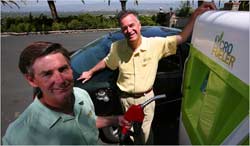Floyd S. Butterfield and Silicon Valley entrepreneur Thomas J. Quinn have designed a personal fueling station that could revolutionize transportation. Their company E-Fuel Corporation, which soon will announce its home ethanol system, the E-Fuel 100 MicroFueler. It will be about as large as a stackable washer-dryer, sell for $9,995 and ship before year-end, but they think the cost could drop by half when government tax credits are applied.
The MicroFueler will use sugar as its main fuel source, or feedstock, along with a specially packaged time-release yeast the company has developed. Depending on the cost of sugar, plus water and electricity, the company says it could cost as little as a dollar a gallon to make ethanol and they calculate that the system will produce only about one-eighth the amount of carbon as a comparable amount of gasoline.
“It’s going to cause havoc in the market and cause great financial stress in the oil industry,” Mr. Quinn boasts.
Mr. Butterfield thinks that the MicroFueler is as much a game changer as the personal computer. He says that working with Mr. Quinn’s microelectronics experts — E-Fuel now employs 15 people — has led to breakthroughs that have cut the energy requirements of making ethanol in half. One such advance is a membrane distiller, which, Mr. Quinn says, uses extremely fine filters to separate water from alcohol at lower heat and in fewer steps than in conventional ethanol refining. Using sugar as a feedstock means that there is virtually no smell, and its water byproduct will be drinkable.
E-Fuel has bold plans: It intends to operate internationally from the start, with production of the MicroFueler in China and Britain as well as the United States. And Mr. Butterfield is already at work on a version for commercial use, as well as systems that will use feedstocks other than sugar.
It takes 10 to 14 pounds of sugar to make a gallon of ethanol, and raw sugar sells in the United States for about 20 cents a pound, says Michael E. Salassi, a professor in the department of agricultural economics at Louisiana State University. But Mr. Quinn says that as of January this year, under the North American Free Trade Agreement, he can buy inedible sugar from Mexico for as little as 2.5 cents a pound, which puts the math in his favor. While this type of sugar has not been sold to consumers, E-Fuel says it is developing a distribution network for it.

